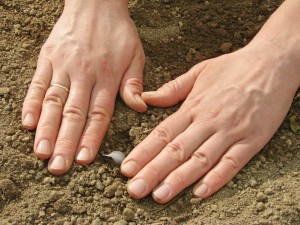Natural Pest Control Begins With Identifying Herbs That Help Deter the Bugs
 If you’ve been gardening for any length of time, you know that pest control is one of the biggest challenges to a healthy bed. You think you’re planting a gorgeous flower bed; bugs see a new smorgasbord. Identifying herbs that act as companion plants may help you deter pests without needing to spray pesticides.
If you’ve been gardening for any length of time, you know that pest control is one of the biggest challenges to a healthy bed. You think you’re planting a gorgeous flower bed; bugs see a new smorgasbord. Identifying herbs that act as companion plants may help you deter pests without needing to spray pesticides.
Not sure where to start? Identifying herbs that will work is not difficult if you know a few guidelines:
Garlic: This workhorse of a plant will provide a host of benefits, including deterring rabbits, aphids, Japanese beetles, snails, ants and cabbage maggots. You can plant it near apple, peach and pear trees, cucumbers, peas, lettuce and celery. Garlic can even be planted near roses, and you’ll love having fresh garlic for your next Italian night.
Dill: Dill is a good companion for lettuce, cabbage, sweet corn, onions and cucumbers. Keep dill away from carrots, lavender, caraway and tomatoes, particularly because it tends to attract tomato horn worms. You should also avoid planting dill near fennel because it will cross-pollinate. It’s worth the trouble to pair it with your plants, though, because it keeps aphids, squash bugs and spider mites at bay.
Borage: This plant attracts bees and wasps and improves soil composition, allowing plants to resist pests and disease. It also deters tomato hornworms and cabbage worms and can be planted alongside strawberries, squash and tomatoes to enhance flavor and boost production.
Basil: Basil will give your tomatoes, asparagus, oregano and peppers improved flavor and will help your petunias thrive. Keep basil away from common rue and sage, and plant chamomile or anise nearby to help your basil plants produce more essential oil.
Rosemary: Rosemary is great for keeping cabbage moths, carrot flies and bean beetles at bay, but don’t plant it near basil or your rosemary will not survive. Instead, plant it near sage, cabbage, beans and carrots.
Mint: Mint varieties can be invasive, so keep it in a container and use the clippings for mulching around turnips, cabbage, mustard and broccoli. It fills a lot of pest-deterring needs, keeping mice away from your garden and repelling ants, black flea beetles, aphids, mosquitoes, cabbage maggots and white cabbage butterflies. You should also be careful to never plant mint varieties near parsley.
Use caution when planting herbs as companion plants to your flowers and vegetables. You’ll want to be sure that you are leaving enough spacing for both plants to thrive and you need adequate drainage and the correct soil composition for each type of plant.
Identifying herbs as a natural way to deter pests requires careful attention, but you’ll have the satisfaction of knowing your plants are thriving and healthy, without pesticides. Don’t forget that important step of labeling each plant with Kincaid Plant Markers! You’ll have a beautiful, pest-free garden with a clean and organized look.
